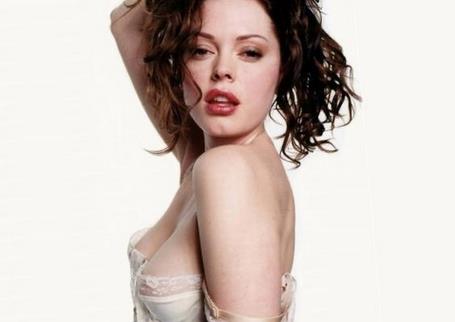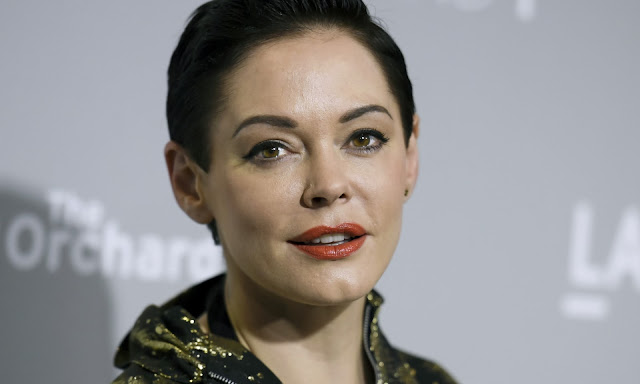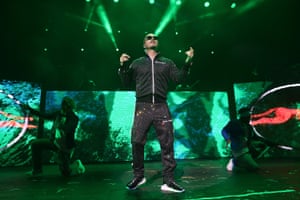
BRAVE
By Rose McGowan
251 pages. HarperOne/HarperCollins Publishers. $27.99.
By Rose McGowan
251 pages. HarperOne/HarperCollins Publishers. $27.99.
If I had read Rose McGowan’s new memoir, “Brave,” in a vacuum, absent the feats of investigative reporting that took down the former Miramax head Harvey Weinstein, I would have thought it overwrought and paranoid. McGowan describes a life of almost ceaseless abuse, of falling into the clutches of one sadistic ogre after another as powerful forces conspired to crush her rogue spirit. “My life was infiltrated by Israeli spies and harassing lawyers, some of the most formidable on earth,” she writes on the first page. “These evil people hounded me at every turn while I went about resurrecting the ghosts that have made up my time on earth.” Come on — Israeli spies?
Of course, we now know: Yes, Israeli spies. In October 2016, McGowan posted three tweets accusing a “studio head” of rape, using the hashtag #WhyWomenDontReport. She was referring to Weinstein, who, it’s since been revealed, had paid her $100,000 for her silence about a 1997 encounter at the Sundance Film Festival in Utah. As Ronan Farrow reported in The New Yorker in November 2017, shortly after McGowan’s tweets Weinstein hired several private security agencies, one run largely by veterans of Israeli intelligence, to try to stop the story of his longtime sexual predation from coming out. Agents were explicitly directed to spy on and undermine McGowan. “It was like the movie ‘Gaslight,’ ” McGowan told Farrow. “Everyone lied to me all the time.”
One of the greatest tricks that the patriarchy plays on women is to deliberately destabilize them, then use their instability as a reason to disbelieve them. Much of “Brave” reads like the diary of a woman driven half-mad by abusive men who assume no one will listen to her. In this case, the truth was finally — and, for McGowan, triumphantly — exposed, but reading “Brave,” I kept thinking about how many more women must be written off as crazy and crushed under the weight of secrets no one wants to hear.
Even before she met Weinstein, McGowan had been through hell. She was raised in the polygamous Children of God cult, though her family fled when its leadership started encouraging sex with children. She then spent years bouncing back and forth between her cruel father and her unreliable mother, who for a time dated a vicious man who McGowan says was later charged with sexually abusing his own daughter. McGowan did a brief stint in rehab during junior high school and later lived as an itinerant street punk. Eventually she made her way to Hollywood and was emancipated from her parents before she was old enough to drive.
This bitter history clearly left a mark, and her book is furious and profane, wild and a little unhinged. “Very few sex symbols escape Hollywood with their minds intact, if they manage to stay alive at all,” McGowan writes early on. There’s no glamour in “Brave,” and very little joy; I’ve never read anything that makes being a starlet sound so tedious and demeaning.

The book hinges on McGowan’s encounter with Weinstein, whom she refers to only as “the Monster.” Here, for the first time, she tells the story of what he did to her. It’s both disgusting and, if you’ve followed the Weinstein coverage, very familiar. She was summoned to a morning meeting in the restaurant of an exclusive hotel in Park City, Utah. When she arrived, the restaurant’s host directed her to Weinstein’s suite, saying he was stuck on a call. “I was certain we would be working together for many years to come, and we were here to plot out the grand arc of my career,” McGowan writes.
Instead, Weinstein pushed her into a room with a Jacuzzi and pulled off her clothes. “I freeze, like a statue,” she writes. As she describes it, he put her on the edge of the Jacuzzi, got in, and performed oral sex on her while masturbating. Her experience sounds similar to the one that the actress and director Asia Argento described to The New Yorker. Like Argento, McGowan says that she feigned pleasure in the hopes of bringing the event to a quicker conclusion. “He moans loudly; through my tears I see his semen floating on top of the bubbles,” she writes.
Afterward, McGowan writes, she was taken to a photo-op with Ben Affleck, her co-star in “Phantoms,” a movie she was promoting. Seeing her shaken and hearing where she came from, the actor said, “Goddamn it. I told him to stop doing that.” (It’s unclear what Affleck meant by that statement; he has never responded to the accusation that he knew about Weinstein’s abuse.) Others, McGowan writes, “counseled me to see it as something that would help my career in the long run.” Wanting to press charges, she spoke to a criminal attorney who told her she would never be believed.
Soon she heard that Weinstein was calling around town telling people not to hire her. “It seemed like every creep in Hollywood knew about my most vulnerable and violated moment,” she writes. “And I was the one who was punished for it.” Her film career was derailed.
 McGowan would eventually find success playing one of a trio of witches on the TV show “Charmed.” She describes working on the show as a deadening experience, a “prison for my mind.” Her sense of martyrdom can be a bit much; she writes of feeling “robbed” by having to get married on TV before her real wedding. “Your entertainment comes at a cost to us performers,” McGowan writes. “You should know this and acknowledge.”
McGowan would eventually find success playing one of a trio of witches on the TV show “Charmed.” She describes working on the show as a deadening experience, a “prison for my mind.” Her sense of martyrdom can be a bit much; she writes of feeling “robbed” by having to get married on TV before her real wedding. “Your entertainment comes at a cost to us performers,” McGowan writes. “You should know this and acknowledge.”
Yet it’s McGowan’s profound dissatisfaction with her profession — one she seems to have fallen into rather than pursued — that has given her the freedom to gleefully burn bridges. She loathes the entertainment business, describing Hollywood as a cult worse than the one she grew up in. Though she’s in her 40s, she sometimes writes with the grandiosity of an alienated adolescent whose mind was blown by “The Matrix.” “You may think that what happens in Hollywood doesn’t affect you,” she writes. “You’re wrong. My darlings, who do you think is curating your reality?”
For most adult readers, it won’t be much of a revelation that Hollywood trades in distortion and exploitation. But I hope “Brave” finds its way into the hands of teenage girls who may still look to actresses as they try to figure out how they’re supposed to be in the world, girls who aspire to the life McGowan once had. In the end, McGowan finds a measure of peace and redemption when she moves behind the camera, becoming a director and multimedia artist, subject rather than object. One of the lessons of her story is that being desired is no substitute for being powerful.
Michelle Goldberg is an Op-Ed columnist for The Times.
NYTIMES
DRAGON





















